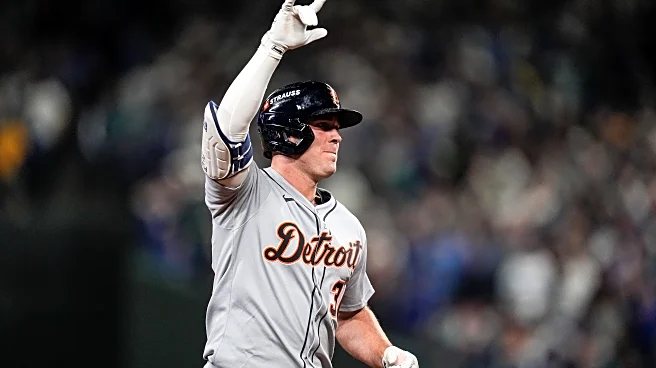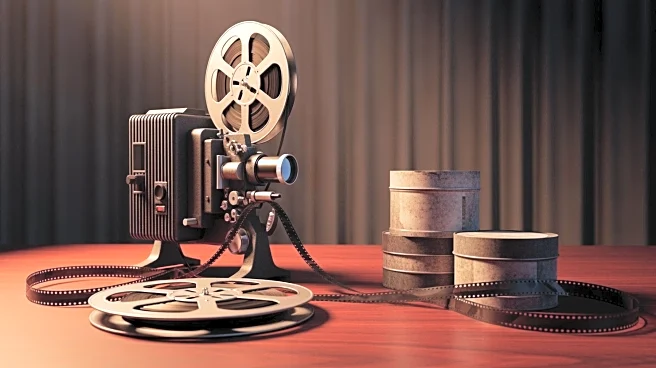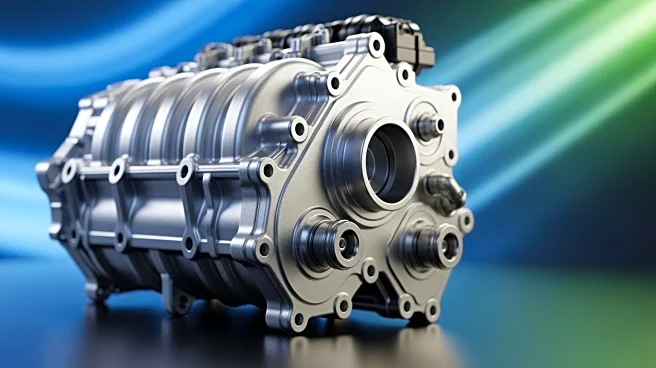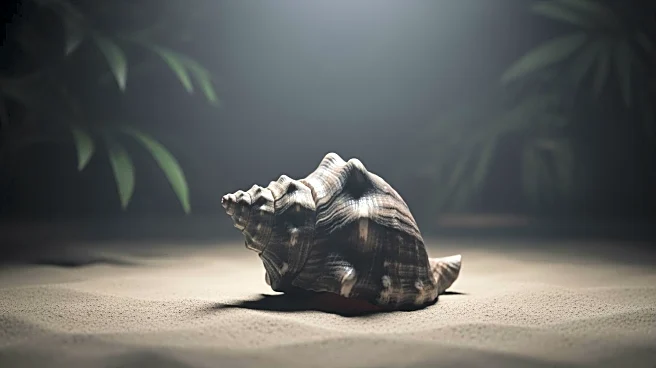Alright, after letting emotions settle over the weekend it’s time for a quick unpacking of the Tigers loss to the Mariners in the ALDS. As you’d expect, there’s been a lot of over-cooked rage bait on sports
talk radio and the media generally, but that’s only natural after a painful loss in an extra innings, winner-take-all game. Now that some of that has settled down and I’ve had a chance to go back and re-watch a few particular innings again, let’s talk about the marathon classic that was Game 5.
Leaving aside how it played out for a moment, the Mariners were obviously favored from the start. Not only did they have home field advantage, but they were by far the hotter team late in the season. The Tigers’ September collapse while the Mariners stormed through the final month of the season gave them home field advantage, and as it played out, that advantage was an edge they likely needed to finish the Tigers off in Game 5.
The Mariners had the better team on paper. The pitching staffs were reasonably well matched, but the Mariners lineup is just a good deal better. Take out each club’s top hitter during the regular season, Cal Raleigh on the Mariners side, and Riley Greene on the Tigers’ side, and the Mariners are still a deeper, better group. The additions of Josh Naylor and Eugenio Suarez at the trade deadline stretched a lineup that already had Julio Rodriguez, Jorge Polanco, and Randy Arozarena in the top two-thirds of their typical batting order, although Suarez has been an absolute zero in the postseason to date.
Meanwhile, Riley Greene at no point looked like he was going to come out of the tailspin that was the second half of the season for him. He hit .212/.257/.364 in the postseason and was a complete non-factor in the postseason other than his go-ahead solo shot off of ace lefty Gabe Speier in Game 4. He didn’t strike out as much as he was in the regular season, but he constantly chased out of the zone, leading to a lot of weak fly balls and just seven hits total in eight games of postseason baseball.
With Gleyber Torres struggling as well, and it emerged after Game 5 that he’s been dealing with a hernia for a month and will require surgery, the Tigers offense just didn’t have the offense they had prior to the collapse in September, let alone the red hot team that ran out to the best record in baseball in the first half. The fact that they out scored the Mariners in the series was a minor miracle, and more of a credit to the pitchers as well as AJ Hinch and Chris Fetter, than an indictment of the Mariners’ offense. When the weak arms on each roster are largely out of the equation and all hands are on deck in the postseason, it is just extremely difficult to put together big innings.
Even without their ace, Bryan Woo, the Mariners starting rotation looked deeper than the Tigers rotation even with Tarik Skubal on the opposing side. George Kirby, Logan Gilbert, and Luis Castillo is just a little better than Skubal, Jack Flaherty, and Casey Mize. Two excellent starts from Skubal helped even things out, as did Troy Melton’s fine outing to kick off Game 1, but at the end, the Mariners still had the ability to pitch Logan Gilbert and Luis Castillo as Game 5 extended beyond regulation into six long extra innings. Jack Flaherty came through with a strong outing under pressure in Game 5 as well, but Dan Miller’s risk of starting Bryce Miller in Game 4 was finally vindicated by the fact that he then had his three top starters, all of whom would be a frontline starter in any rotation in the game was a difference maker for them in Game 5.
The Mariners deeper bullpen didn’t really end up a major factor in the series. Will Vest was brilliant and established himself as one of the top relievers in baseball this season. But beyond him, Kyle Finnegan never looked quite as sharp as he did before the groin injury that put him on the injured list in September. The Tigers had problems all year in the bullpen in terms of left-handed relief help. Tyler Holton has been one of the most valuable relievers in the game the past two seasons, but predictably couldn’t keep it going a third straight year. Brant Hurter picked up some of the slack with a pretty strong season until he started to struggle and then was shutdown for a few weeks with a back injury. He just never looked right afterwards and had a pretty tough postseason as well. The only thing that held them together was Troy Melton’s work in Game 3 and Game 5.
So in the end, Hinch was trying to piece things together with Flaherty and then either Tommy Kahnle, Brant Hurter, or Rafael Montero beyond the 12th inning. Dan Wilson still had a good reliever in Eduard Bazardo and then a good starting pitcher in Castillo pitching on regular rest. We could debate whether Hurter or Montero would’ve been the better choice in the 15th inning, but none were good options and Castillo could’ve kept going for another 4-5 more innings.
Once Flaherty, working on three days rest, was spent, the Tigers were on fumes with nothing but poor options remaining. Dan Wilson still had a good starting pitcher who was fully rested to deploy. There were plenty of chances for either team to win the game prior to the 15th inning, but the Tigers went 1-for-9 with runners in scoring position. The Mariners failed just as badly, going 1-for-10 with runners in scoring position. But in the 15th, Kahnle melted down and Jorge Polanco singled through the right side of the infield to walk it off.
Ultimately the reason the Tigers lost that game is just that the Mariners managed one more single with runners in scoring position than the Tigers did. Trying to pin that kind of loss on one player or the manager is just wanting a scapegoat. The Mariners had the horses in a marathon Game 5 as well as home field advantage. Most of the underlying issues in this game were put in place by the front office and several of the club’s best hitters in September, and yet the Tigers outscored them in the series. For all the failure to find starting pitching at the deadline did to accelerate their second half slide, it didn’t end up as a big factor in the postseason. It contributed to them losing home field advantage and then the division down the stretch setting tougher conditions through the postseason. It also left them short an arm when Game 5 went deep into extra innings, but by that point the Tigers had squandered a ton of different chances to score a go ahead run.
Riley Greene and Spencer Torkelson
We can pick apart Hinch’s decisions here and there, but ultimately the biggest reason the Tigers lost this series was because their two big bats, the long looked for core of a resurgent Tigers’ franchise, were downright terrible when the chips were down. The Tigers did a very good job keeping Cal Raleigh and Julio Rodriguez in check during the series, but Greene and Torkelson were almost totally absent. The way their seasons ended was more ominous than the loss. A better Tigers roster could still have lost a five-game ALDS in extra innings by a run, and it wouldn’t necessarily have you worried about the future. The duo is still relatively young, but they’ve got four years in the league and four postseason series under their belts already. The fact that they were so entirely shut down in this series and Game 5 in particular was tough to overcome, particularly with Gleyber Torres and Colt Keith playing through injuries and ineffective as well.
In Harris and Hinch’s end of the season presser, Harris sounded just as baffled as everyone else at the fact that Greene in particular abandoned any pretense toward zone control and continued to swing at anything and everything he saw, while being unable to adjust to more of an opposite field, take your singles where you can, approach.
In Game 5, Greene struck out twice, Torkelson four times, and Colt Keith three as they went 0-fer in a 15 inning game, with a walk to Greene the only appearance on-base in Game 5. Keith only came back from a rib injury in this series with no rehab work, so we’ll leave him out of this for the moment, but here are Greene and Torkelson’s postseason numbers across eight games.
Greene: .212/.257/.364, 1 HR, 62 wRC+
Torkelson: .188/.207/.281, 0 HR, 69 wRC+
Of course, just for a little flavor, here is Eugenio Suarez’s statline in the postseason for those who really wanted to trade for him.
Suarez: .138/.194/.276, 1 HR, 34 wRC+
The playoffs are just different, folks.
That is not what you want to see out of your homegrown 3-4 hitters, obviously. Beyond any other nits we want to pick, from pitcher usage to pinch-hit decisions, the Tigers did well to take this to the 15th round of a Game 5. It’s just hard to overcome that big a hole in the heart of your order. Nothing else compares as a factor to the lack of contributions from the two guys you’ve theoretically been building a lineup around for the last four seasons.
Tarik Skubal
There a couple points to consider where the game might have gone a different way. The Tigers ace was spectacular in Game 5, pitching an instant classic with 13 strikeouts and only two hits and one earned run allowed. The question since the game was whether or not he should’ve stayed in to pitch the seventh inning.
Skubal threw 99 pitches in this one and definitely looked like he thought his day was done when he struck out Cal Raleigh for the second time to end the sixth inning. That roar as he came off the mound said as much, but we’ll never know if he could’ve given them another good inning or not. 100 pitches is usually the end point in a start, and there was nothing to suggest that Skubal pushed at all to go back out there. Probably if he’d been adamant that he had another inning in him, Hinch would’ve relented, but both seemed clear that this was the point to turn the game over the bullpen.
At that point, Skubal was at his limit. Even in his complete game shutout of the Guardians in late May, he only threw 94 pitches, recording an extremely rare Maddux. The days of the elite pitchers throwing 115-120 are long over. Perhaps he could’ve done it, but not only the pitch count but the Mariners lineup dictated that this was the moment. With Julio Rodriguez, Jorge Polanco, and Eugenio Suarez coming up, you had three good right-handed hitters on tap in the seventh. That’s exactly the spot Kyle Finnegan was acquired to handle, with his heavy splitter usage also a remedy against major platoon splits.
Whether Hinch just didn’t want to give Polanco another crack at a tiring Skubal, or whether this was just predetermined, Skubal certainly seemed to be expecting it and felt he was running on fumes. Still, if the Tigers could’ve bridged the game closer to Will Vest’s entry without coughing up that run, everything is probably different. The Tigers just did not have the bullpen. If you can’t get one inning out of two of your three most trusted relievers, you’ve got an issue that needs solving by the front office.
Who the heck is Leo Rivas?
Finnegan was excellent for the Tigers after being acquired at the trade deadline, but he hasn’t been quite as sharp since his groin injury. There’s still no way of getting around the fact that he’s either the Tigers best or second best reliever behind Will Vest. I’d vote the latter, but either way this is the spot for him. The plan was to get Kyle Finnegan into the eighth, and then Will Vest the rest of the way. That’s the best plan Hinch had available to him.
As it happened, Finnegan got the two right-handed hitters to fly out, but Polanco is a switch-hitter and drew a walk hitting left-handed. Josh Naylor singled and Hinch went to Tyler Holton to face a fairly dangerous left-handed hitter in Dominic Canzone after Dan Wilson pinch-hit for Mitch Garver. Wilson countered with a rookie right-handed hitter in Leo Rivas, and Holton made a bad pitch, spotting an 0-1 changeup in the exact same spot middle-down that he’d just gotten ahead with a cutter.
Leo Rivas should have been reasonably easy work. He’s a 28-year-old veteran minor league player with 197 plate appearances in the Show and zero power. He walks a lot, but he strikes out a league average amount and isn’t some contact sorcerer. I thought he might try to bunt for a hit. All Holton needed to do was get a ball in the air and with Rivas meager power the inning is almost certainly over. Holton just blew it there, yanking an 0-1 changeup down and right over the middle of the plate when Dillon Dingler called for it on the outer edge and away. Rivas lined an RBI single to left to tie the game, and the rest is history. There are a whole host of dangerous Mariners a manager has to account for, and no offense to Mr. Rivas but he is not one of them.
Tyler Holton has had two very good years with the Tigers despite his low strikeout rates. Few relievers go on stacking good year after good year behind them, particularly when they don’t strike out many batters and are throwing a really heavy volume of innings out of the bullpen.
Ultimately the problem here is not having a good left-handed reliever who can strike a lot of hitters out. Considering how heavily the Tigers weigh platoon matchups into their offensive equation, the failure to add another good southpaw reliever to the mix this year was the kind of under discussed mistake that suddenly rears its head at the worst possible time.
Once again though, it the grand scheme of things, this series is not at all on the Tigers’ pitching staff, nor the pitching decisions. Despite looking overmatched on paper headed into the series, they held the Mariners to three or less runs in four of the five games, the Tigers offense outscored them over the course of the series, and they still lost.
To pinch or to not pinch hit
A lot commentary and criticism came from the fact that Hinch uncharacteristically did not use his bench at all in Game 5. In fairness it’s not that great a bench. Trey Sweeney was there just as a last resort at shortstop and really a waste of a roster spot. Andy Ibáñez didn’t even have a role with Jahmai Jones taking over as their top pinch-hitting option against left-handers. And Wenceel Pérez had a good year at the plate and switch-hits, but struggled almost as badly as Greene down the stretch and in the postseason.
Jones is 28, and he has a long track record established of struggling badly against right-handed pitching. He also is a subpar defender in either corner outfield spot. If Wilson had gone to his second lefty, Caleb Ferguson, no doubt Jones would’ve pinch-hit for someone. Probably that was the move Hinch was waiting for, but Wilson had too many other good arms to bother.
The one pinch-hitting decision Hinch made was not using Jones in place of Kerry Carpenter against lefty Gabe Speier. Obviously that was the right move. First, you can’t lose Carpenter when no one else but Javy Báez is doing much at the plate. Second, because Carpenter did what Greene and Torkelson could not in the postseason. He became more selective at the plate, chased less than normal, and in that at-bat in the fifth inning, crushed a two-run shot that was the difference in the game until the seventh.
If there’s a little beef to be had, I would’ve still expected to see Wenceel Pérez get a plate appearance in there somewhere. Better against left-handed pitching as a right-handed hitter, Pérez would still out-hit Parker Meadows and while the defensive liability could have cost them the game, and Pérez wasn’t really any better at the plate than Meadows, there were still two opportunities to hit for Meadows.
In the 12th, Meadows was up with no outs and Zach McKinstry and Dillon Dingler on first and second. This was the Tigers best chance to score. Hinch decided to have Meadows drop down a sacrifice bunt, which he did successfully. McKinstry was thrown out at home on a Javy Báez grounder to third, the Mariners gave Carpenter a free pass, and Torres flew out to end the inning.
Meadows was probably the best option there since they were planning to bunt the runners over anyway.
The next time Meadows came up, Dingler was on second base after a one-out double in the top of the 14th. Surely, this was the time to try and get a single. Meadows took a called strike three, and Báez popped out to first.
When things don’t work, you always wish you’d tried the other thing. Maybe Pérez would’ve come through. Meadows swings were so feeble that I would’ve preferred Pérez’s chances of putting a ball in play and coming through with a go-ahead RBI single. Still, neither of them had much of a chance the way they were swinging the bats.
Maybe Pérez or even Jahmai Jones could’ve pinch-hit for Colt Keith somewhere along the way instead. Keith didn’t have any better a game than Greene and Torkelson. However, he is a better pure hitter by far than either of them in terms of making contact, particularly against right-handed pitching and only had four games back from a rib strain that he returned from as soon as possible. The more swings he got, the more likely it was that he’d shake the rust off.
Again though, it didn’t work.
The top performers
Before we wrap Game 5 and move on to the offseason, let’s just take a minute to appreciate the players who did play well. Kerry Carpenter had a really good postseason as he and Báez really led the offense. Not only in terms of production, but in terms of adapting their approach to the steady doses of premium pitching they were going to see, those outshined the rest of the lineup by a lot. Báez barely struck out, he had big hits and small hits, and he used the whole field in ways his younger teammates failed to do, all while playing outstanding shortstop and picking up a few extra bags on the basepaths. Carpenter was simply more patient than usual and again showed himself ready for the big moments where their younger teammates in Greene and Torkelson in particular, were not.
It goes without saying that Skubal was great, but Will Vest has emerged as one of the better relievers in baseball over the past year and change, and he showed it again with eight nearly perfect innings of postseason pitching under maximum pressure. Vest didn’t allow a run, he didn’t walk a batter, he allowed just two hits, and he struck out nine. Well done.
We’ll also give big nods to both Troy Melton and Keider Montero, who were nails in the series despite their relative lack of experience. The Tigers got away from their own philosophy of internal development this year in Montero’s case, and he clearly took it personally when he couldn’t crack the rotation regularly even as Chris Paddack and Charlie Morton crumbled to dust after the Tigers acquired them. Melton has the inside track to a spot in the 2026 rotation. Montero is still on the outside looking in, but he’s proven himself a worthy member of the pitching staff, and probably should’ve been in the bullpen all along, at least. He will probably get a more consistent look at a relief role next season.
In the end, while many would like to have a decision to blame the loss on, the problem here was just great pitching from the Mariners, and the failure of the Tigers big bats to come through.









